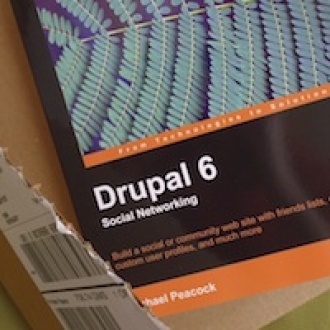
The first thing I have to mention about Drupal 6 Social Networking (by PACKT Publishing) is that this book will be extremely handy to anybody new to Drupal and those looking for recipes to build community sites. It gives you the basic understanding of how Drupal works and what buttons you need to push to achieve desired results. It has great step by step tutorials (with screenshots) on the vast majority of common tasks you do with a Drupal site: content, menu and user management, permissions, adding and configuring modules, etc. It also helps you understand how Drupal modules integrate with each other to extend site functionality.
Experienced Drupal users (like myself) most probably will not find in this book much new, but I'd anyway recommend that you browse it through. I picked up a few new tips and tricks from it. Say, did you know that you can use Word 2007 to post to your Drupal directly (via xml-rpc protocol)? I haven't been using Word for quite a long time now, but it was a real revelation to me, as you can do basically the same thing with many other word processing software (including open-source gems).
What I really liked about Drupal 6 Social Networking was the choice of modules the author suggested to build a community site. As far as I see, even many experienced developers can't keep track of all the modules appearing on drupal.org, and this books is of help here. When you choose a module for your site you should pay attention to how the particular module is supported by developer, and it is not advised to go with modules which have no updates or have abandoned/unanswered issue queues. In this terms the author did a good job picking nice modules to build your site with.
The way the book describes the whole process of building a Drupal powered community site is quite simple, neat and logical. And again you should not be a Drupal or PHP guru to understand how to do it. The book really guides you. One drawback though is that you might find yourself jumping between first chapters containing general guidelines and chapters with comprehensive explanations of particular tasks (say, user management or setting up OrganicGroups (OG) module).
If you want to go slightly deeper with customization, there is a very basic explanation and examples of how to build your very own Drupal module or theme. But those who are thinking about creating their own modules should probably get themselves a geekier manual on those issues or just do a research on the internet regarding Drupal programming and expanding their projects. However, these chapters in Drupal 6 Social Networking are a good kick start with custom (or at least customized) development.
To sum it up, this is a useful book for a novice Drupal users that contains many tips on Drupal management (and not only for social networks).
Disclaimer: the book was provided for review by PACT Publishing. Above is my sole opinion on the book which can not be considered as advertising of any kind.